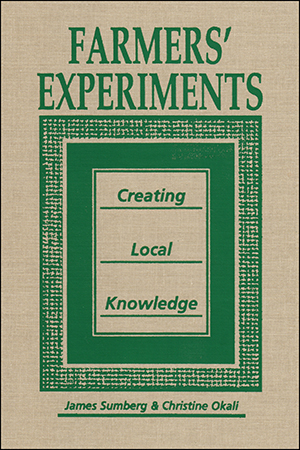Over the last two decades, growing interest in greater farmer participation in formal agricultural research has had major implications both for investment priorities and for models of organization, implementation, and management of agricultural R&D.
Sumberg and Okali identify, characterize, and contextualize the experimental activities undertaken by farmers themselves, providing a theoretical and empirical base from which alternative models for the interaction of formal research and farmers' experiments can be evaluated. Their work is a seminal contribution to the debate among donors and development agencies, as well as in academic circles, about the search for more socially and economically acceptable models for the development and transfer of agricultural technology.
James Sumberg and Christine Okali are lecturers in the School of Development Studies at the University of East Anglia (U.K.).
"This book is worthwhile reading for graduate students starting to think about fieldwork overseas, to academicians, to donors in governmental agencies and NGOs."—Dorothea Bedigian, Economic Botany
"This is a fascinating book and ... deserves to be widely read."—John Farrington, European Review of Agricultural Economics
"A thought-provoking book [that] goes against much of the current orthodoxy and counters the move to institutionalise participation in every stage of technology development."—Diana Carney, Development Policy Review
"This book reports careful work which has important conclusions for all concerned with agricultural development."—Steve Wiggins, Development in Practice
"This book consciously rejects the top-down model.... Authors James Sumberg and Christine Okali depict African farmers discussing their ideas with neighbors, trying them out on parts of their land, and noting the results ... Africans listened to those who had already tried new methods in their area, rather than those with knowledge of what ought to work. In the process of unveiling this the authors show how so many mistakes were made in the past by researchers as well as by promoters, in the assumptions they made about African "character," motivation, and patience."—Brian Bowles, Journal of Developing Areas
"Forces the reader to go beyond the rhetoric of participatory development to consider hard practicalities."—Elon Gilbert








